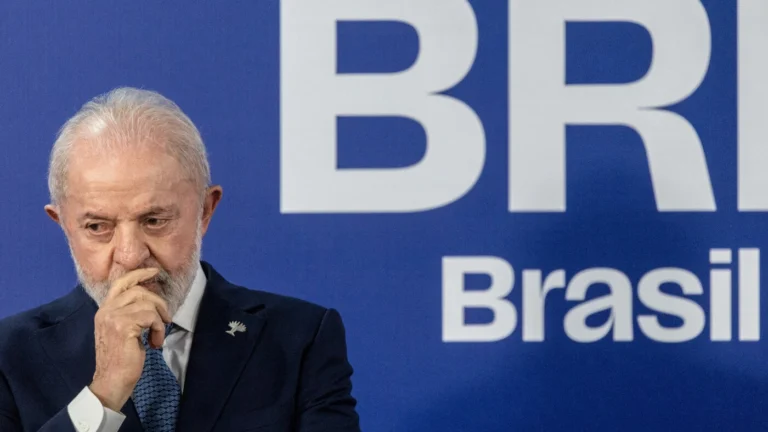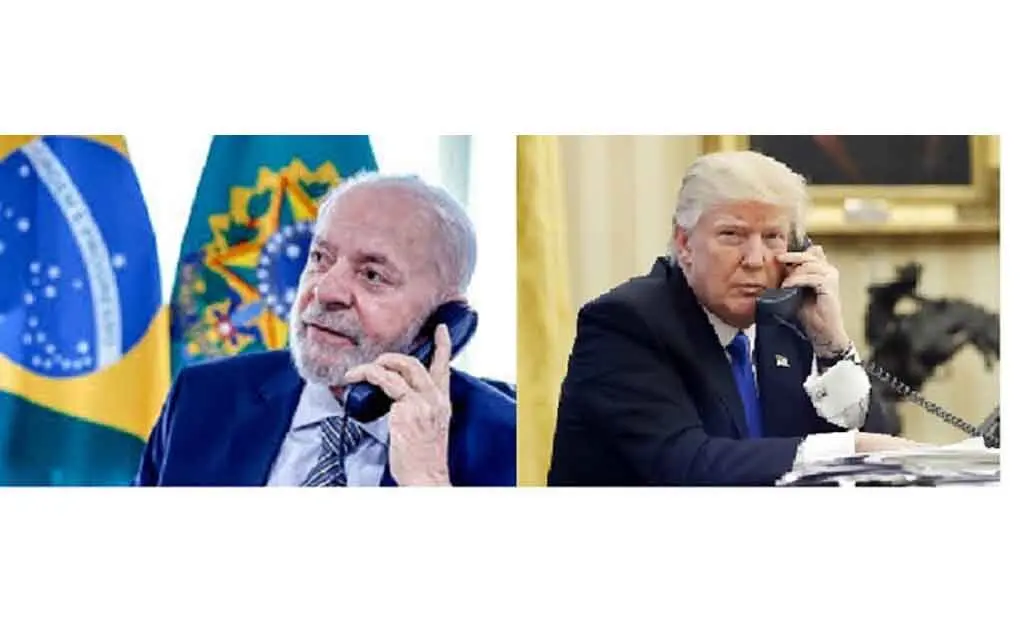Critical Truths About COP30 Brazil 2025: Lula’s Bold Invitation to Trump Amid Climate Crisis and Geopolitical Tensions

Luiz Inacio Lula da Silva, Brazil’s president, during a news conference, Brazil, 5/8/ 2025.
August 5, 2025 Hour: 7:31 pm
COP30 Brazil 2025 takes center stage as President Lula confirms he will call Trump to invite him to the climate summit in Belém, emphasizing global cooperation despite political divides.
Related: Brazilian Workers’ Party (PT) Shows Support for Bolsonaro’s House Arrest
7 Critical Truths About COP30 Brazil 2025: Lula’s Bold Invitation to Trump Amid Climate Crisis and Geopolitical Tensions
On August 6, 2025, Brazilian President Luiz Inácio Lula da Silva announced a diplomatic move that has captured global attention: he will personally call former U.S. President Donald Trump to invite him to the COP30 United Nations Climate Change Conference, set to take place in Belém, Pará, from November 10 to 21, 2025. This gesture, both symbolic and strategic, underscores Brazil’s determination to place the Amazon rainforest at the heart of the global climate agenda—even as it navigates deep political divides and international skepticism.
The COP30 Brazil 2025 summit is not just another climate conference—it’s a high-stakes effort to recenter global environmental action in the world’s most vital ecosystem.
Lula made the announcement from Brasília, clarifying that the call to Trump would not address the tariffs imposed by the U.S. on Brazilian goods, which he described as politically motivated and non-negotiable under current conditions.
“I won’t call Trump to talk about trade—he doesn’t want to talk,” Lula said. “But I will call him to invite him to COP30, because I want to know what he thinks about the climate crisis. I will extend the courtesy.”
The invitation extends to other global leaders, including Chinese President Xi Jinping and Indian Prime Minister Narendra Modi, while Russian President Vladimir Putin will not be contacted due to travel restrictions and ongoing geopolitical tensions.
COP30 Brazil 2025: The Amazon Speaks to the World
The decision to host COP30 in Belém, a city in the heart of the Amazon Basin, is deeply symbolic. As the planet faces record-breaking temperatures, wildfires, and biodiversity loss, Lula has positioned the summit as a moral and ecological imperative—a chance for the world to listen to the voice of the rainforest.
By bringing COP30 to the Amazon, Brazil is turning the region from a victim of climate change into a central protagonist in the fight against it.
The Amazon, often called the “lungs of the Earth,” plays a critical role in carbon sequestration, weather regulation, and housing 10% of the world’s known species. Yet it has suffered decades of deforestation, illegal mining, and land grabs—much of it accelerated under previous Brazilian administrations.
Lula has pledged to achieve zero deforestation by 2030, and COP30 is seen as a showcase of Brazil’s renewed environmental leadership. The president insists the summit must go beyond declarations and result in concrete financial commitments from wealthy nations to support forest conservation, sustainable development, and Indigenous rights.
Without funding, promises are empty. Lula is demanding that rich countries honor their climate finance pledges.
External Link: UNFCCC – COP30 Official Page
External Link: World Resources Institute – Amazon Deforestation Data 2025
Geopolitical Context: A Fragile Multilateral Moment
The COP30 Brazil 2025 summit unfolds in a highly polarized global landscape, where climate action is increasingly entangled with trade wars, national security, and ideological divides.
Climate change is no longer just an environmental issue—it’s a geopolitical battlefield.
Lula’s invitation to Donald Trump is particularly bold, given the former U.S. president’s history of climate denial, his withdrawal from the Paris Agreement—a move set to take full effect in January 2026—and his administration’s rollback of environmental regulations.
In April 2025, the U.S. government closed its Office of Climate Diplomacy, raising alarms about Washington’s commitment to international climate negotiations. If the U.S. fails to engage meaningfully in COP30, it could undermine the summit’s legitimacy and weaken global emissions reduction goals.
Still, Lula’s outreach reflects a pragmatic vision: even leaders who deny climate science must be part of the conversation. As he put it: “We don’t have the luxury of excluding anyone from saving the planet.”
The summit also faces challenges from geopolitical rivalries. While China and India are expected to attend, their own emissions trajectories and development priorities could clash with calls for aggressive decarbonization. Meanwhile, Russia’s absence—due to sanctions and travel bans—removes another major emitter from the table.
Lula’s Climate Diplomacy: Bridging Divides for Global Action
President Lula has positioned himself as a leading voice for multilateralism in an era of rising nationalism. Over the past two years, he has reactivated Brazil’s role in BRICS+, the G20, and the UN, using these platforms to advocate for a just energy transition and climate justice.
For Lula, climate change is inseparable from inequality, colonialism, and economic justice.
His government has launched initiatives to:
- Expand renewable energy (solar, wind, biofuels),
- Strengthen Indigenous land rights (recognized as key forest protectors),
- Combat illegal mining and logging through satellite monitoring and federal task forces.
The Ministry of Environment and Climate Change, led by Marina Silva, has reported a significant reduction in deforestation rates since 2023—proof, Lula argues, that political will can reverse environmental damage.
Yet, the president also faces domestic criticism. Some environmental groups have questioned large infrastructure projects, such as hydroelectric dams and port expansions, which they say threaten fragile ecosystems. Balancing development and conservation remains a delicate act.

Why Trump’s Participation Matters—Even If He Denies Climate Change
Inviting Donald Trump to COP30 is not about expecting conversion—it’s about accountability, visibility, and pressure.
If Trump attends, he will be forced to confront the reality of the Amazon. If he refuses, the world will see his isolation.
By extending the invitation, Lula ensures that:
- The U.S. cannot ignore the summit, even if its current leadership is hostile to climate action.
- Global media attention remains focused on American responsibility as the largest historical emitter.
- Civil society and youth movements can directly challenge climate denial on a world stage.
Moreover, if Trump is considering a 2028 comeback, his response to the invitation could signal his future stance on environmental policy.
Lula’s approach reflects a broader strategy: engage, don’t isolate. As he stated: “The Amazon belongs to Brazil, but its survival belongs to humanity.”
Expectations and Challenges for COP30
The success of COP30 Brazil 2025 will be measured by three key outcomes:
- New financial commitments to the Amazon Fund and Green Climate Fund.
- Binding agreements on deforestation, biodiversity, and Indigenous rights.
- A clear roadmap for global emissions reduction aligned with the 1.5°C target.
COP30 must deliver action, not just speeches.
Brazil is pushing for a “Belém Declaration” that would institutionalize Amazon protection as a global common good. The summit will also highlight the role of traditional knowledge and local communities in climate resilience.
However, logistical and political hurdles remain. Security, infrastructure, and international access in remote Belém are ongoing concerns. And with global climate financing still falling short of the $100 billion annual pledge, skepticism persists about whether wealthy nations will follow through.
Conclusion: A Summit of Consequences
The COP30 Brazil 2025 summit arrives at a make-or-break moment for the planet. With the Amazon nearing a tipping point where it could turn from rainforest to savanna, the stakes could not be higher.
President Lula’s decision to personally invite Donald Trump—despite their ideological chasm—is a testament to the urgency of the crisis. It’s a call for unity, not uniformity.
In the face of planetary collapse, diplomacy must be bold, inclusive, and relentless.
Whether COP30 becomes a turning point or another missed opportunity will depend on the courage of leaders, the pressure of civil society, and the power of collective action.
As Lula reminded the world: “We are not here to celebrate. We are here to save what can still be saved.”
External Link: IPCC – Sixth Assessment Report, 2025 Update
Author: JMVR
Source: VTV

